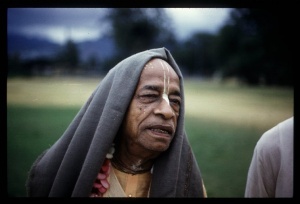CC Madhya 19.146: Difference between revisions
No edit summary |
(Vanibot #0054 edit - transform synonyms into clickable links, which search similar occurrences) |
||
| Line 17: | Line 17: | ||
<div class="synonyms"> | <div class="synonyms"> | ||
''veda-niṣṭha-madhye'' | ''[//vanipedia.org/wiki/Special:VaniSearch?s=veda&tab=syno_o&ds=1 veda]-[//vanipedia.org/wiki/Special:VaniSearch?s=niṣṭha&tab=syno_o&ds=1 niṣṭha]-[//vanipedia.org/wiki/Special:VaniSearch?s=madhye&tab=syno_o&ds=1 madhye]'' — among persons who are followers of the ''Vedas''; ''[//vanipedia.org/wiki/Special:VaniSearch?s=ardheka&tab=syno_o&ds=1 ardheka]'' — almost half; ''[//vanipedia.org/wiki/Special:VaniSearch?s=veda&tab=syno_o&ds=1 veda]'' — Vedic scriptures; ''[//vanipedia.org/wiki/Special:VaniSearch?s=mukhe&tab=syno_o&ds=1 mukhe]'' — in the mouth; ''[//vanipedia.org/wiki/Special:VaniSearch?s=māne&tab=syno_o&ds=1 māne]'' — accept; ''[//vanipedia.org/wiki/Special:VaniSearch?s=veda&tab=syno_o&ds=1 veda]-[//vanipedia.org/wiki/Special:VaniSearch?s=niṣiddha&tab=syno_o&ds=1 niṣiddha]'' — forbidden in the ''Vedas''; ''[//vanipedia.org/wiki/Special:VaniSearch?s=pāpa&tab=syno_o&ds=1 pāpa]'' — sins; ''[//vanipedia.org/wiki/Special:VaniSearch?s=kare&tab=syno_o&ds=1 kare]'' — perform; ''[//vanipedia.org/wiki/Special:VaniSearch?s=dharma&tab=syno_o&ds=1 dharma]'' — religious principles; ''[//vanipedia.org/wiki/Special:VaniSearch?s=nāhi&tab=syno_o&ds=1 nāhi]'' — not; ''[//vanipedia.org/wiki/Special:VaniSearch?s=gaṇe&tab=syno_o&ds=1 gaṇe]'' — count. | ||
</div> | </div> | ||
Latest revision as of 22:26, 19 February 2024

A.C. Bhaktivedanta Swami Prabhupada
TEXT 146
- veda-niṣṭha-madhye ardheka veda ‘mukhe’ māne
- veda-niṣiddha pāpa kare, dharma nāhi gaṇe
SYNONYMS
veda-niṣṭha-madhye — among persons who are followers of the Vedas; ardheka — almost half; veda — Vedic scriptures; mukhe — in the mouth; māne — accept; veda-niṣiddha — forbidden in the Vedas; pāpa — sins; kare — perform; dharma — religious principles; nāhi — not; gaṇe — count.
TRANSLATION
“Among human beings, those who are followers of the Vedic principles are considered civilized. Among these, almost half simply give lip service while committing all kinds of sinful activities against these principles. Such people do not care for the regulative principles.
PURPORT
The word veda means “knowledge.” Supreme knowledge consists of understanding the Supreme Personality of Godhead and our relationship with Him and acting according to that relationship. Action in accordance with the Vedic principles is called religion. Religion means following the orders of the Supreme Personality of Godhead. The Vedic principles are the injunctions given by the Supreme Personality of Godhead. Āryans are civilized human beings who have been following the Vedic principles since time immemorial. No one can trace out the history of the Vedic principles set forth so that man might understand the Supreme Being. Literature or knowledge that seeks the Supreme Being can be accepted as a bona fide religious system, but there are many different types of religious systems according to the place, the disciples and the people’s capacity to understand.
The highest type of religious system is described in Śrīmad-Bhāgavatam (SB 1.2.6) thus: sa vai puṁsāṁ paro dharmo yato bhaktir adhokṣaje. The highest form of religion is that by which one becomes fully conscious of the existence of God, including His form, name, qualities, pastimes, abode and all-pervasive features. When everything is completely known, that is the perfection of Vedic knowledge. The fulfillment of Vedic knowledge is systematic knowledge of the characteristics of God. This is confirmed by Lord Kṛṣṇa in the Bhagavad-gītā (BG 15.15): vedaiś ca sarvair aham eva vedyaḥ. The aim of Vedic knowledge is to understand God. Therefore those who are actually following Vedic knowledge and searching after God cannot commit sinful activities against the Supreme Lord’s order. However, in this Age of Kali, although men profess to belong to so many different kinds of religions, most of them commit sinful activities against the orders of the Vedic scriptures. Śrī Caitanya Mahāprabhu therefore says herein, veda-niṣiddha pāpa kare, dharma nāhi gaṇe. In this age, men may profess a religion, but they actually do not follow the principles. Instead, they commit all kinds of sins.